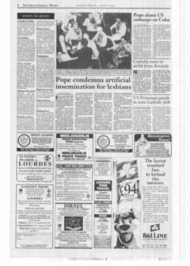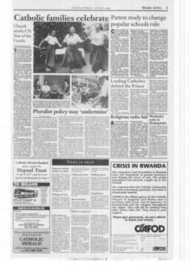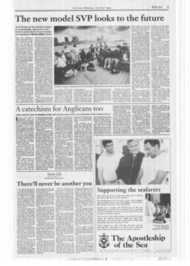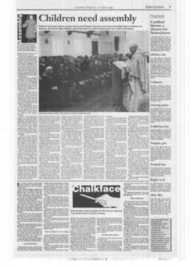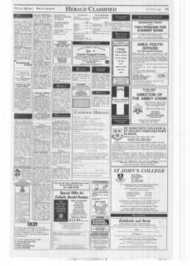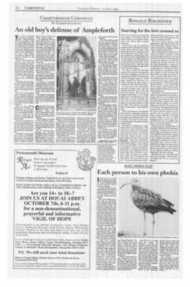Page 5, 1st July 1994
Page 5
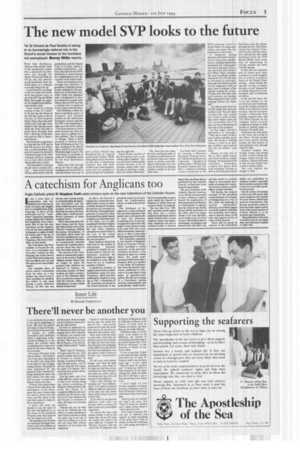
Report an error
Noticed an error on this page?If you've noticed an error in this article please click here to report it.
Tags
Share
Related articles
An Article Of Faith And A Bestseller
By Stephen Trott
Journalists Feasting On A Papal Plot
Tried And Trusted Formula Catechism Pleases The Pope
New Catechism Sent For Papal Approval
A catechism for Anglicans too
Anglo-Catholic priest Fr Stephen Trott casts envious eyes on the new Catechism of the Catholic Church IT WAS A LONG time in preparation, and was delayed even at the last in order to restore the English text to a readable form of the language, in place of the politically-correct "nonsexist" American university campus dialect into which it had originally been translated. But at last the new Catechism of the Catholic Church has been published in England, to sighs of relief all round, and to the joy of the publishers, Geoffrey Chapman, who have a bestseller on their hands.
The Catechism has been available in French for two years or so, and makes very enjoyable reading in that language, but at last, here is a book which both clergy and laity can afford, and use, and rely upon, in our own mother tongue.
One valuable piece of advice which I remember from my days as a law student was: never to try to learn anything too detailed, but rather to rely upon having a good reference library. In this way one devotes one's mental energy to comprehending all-important principles; and the advice which one gives comes straight off the bookshelf, fresh and accurate each time, rather than a half-remembered summary of some complex issues.
That is also good advice for busy clergy, and for those who wish to know more of the Church's teaching, without becoming theologians. A Catechism which states the Church's teaching in an encyclopaedic fashion is therefore an exceptionally valuable resource for a parish priest, and for those who want to take their faith seriously.
The arrival of this Catechism is of particuLar importance in the modern English religious context, where it can no longer be taken for granted that children are baptised in infancy. An increasing number of those making an adult commitment to the Christian faith have no previous connection with the Church, either as individuals or as part of their family background. In effect, the Church is engaged in a missionary situation in this country, in which carefully-designed teaching documents are essential as the Decade of Evangelisation proceeds. It cannot be taken for granted that adult Church members, let alone those new to the faith, are as fully acquainted with their religion as was the case, even before the war, when religious education was much closer to the core of the school curriculum than is generally the case nowadays.
Many Anglican clergy look with envy at the quality of educational material published in English for use by the Catholic Church. The literature produced for RCIA, in particular, ought to be emulated in some official form for use in Anglican parishes, I believe.
A significant number of Anglican priests have on their bookshelves copies of a New Catechism, which was first published in English as long ago as 1967, a translation of the Catechism produced by the Dutch hierarchy. It has proved its worth as a resource book, for Confirmation classes, as well as for private study.
The freshness of its approach to many technical and doctrinal questions has made it also a rich quarry for at least one preacher, wondering how to present complicated issues from the pulpit! It does however need to be used with care as an official document, representing as it does a generally liberal approach to the faith.
The Catechism contained in the Church of England's Book of Common Prayer, which provided a useful summary of the principal Christian doctrines, to be learned by heart in a world where few could read, amounts to little more than a liturgical form as a preface to the Order of Confirmation. Even the Revised Catechism, published in 1962, runs to no more than 20 tiny pages of question-andanswer. But the very concept of a Catechism, stating doctrine systematically and methodically, would proba bly prove impossible to agree upon within the Church of England, in which there are so many shades of emphasis.
The very idea if an "official" catechism would suggest that there was a central authority in doctrinal matters which would be alien to most Anglican minds and aspirations. Anglicans who are so inclined prefer to borrow where they can from what is published by the Catholic Church, as they have been doing for generations.
The new Catechism of the Catholic Church, however, can be firmly recommended to those wishing to explore further the implications of their preparation for Baptism or Confirmation. It appears that the Church has finally thrown off the hesitations of the 1960s, and is no longer afraid to use such old-fashioned words as sin. For 20 or 30 years, liberal philosophers, theologians, sociologists and lawyers have had their way, and the result is a society which is increasingly incapable of making the connection between sinners and the effects of their activities The family, the clearest example of this spiralling moral paralysis, is in dabger of disappearing as a w4y of life, under the challenge of various "alternative" lifestyles, all of which apisear to provide children with little but instability and mi cry, and to deprive them o the love and support of ore or other of their parents.
There will of course be aspects of the Catechism which are unfamiliar to Anglican readers, especially those sections concerned with Canon Law and with conciliar documents.
But the clarity of teaching of this book will ensure that many Anglicans also benefit from the labours which have gone into its production. The present generation needs to hear the truth, spoken and in print, lithe moral anarchy of modern Britain is to be arrested and turned back.
The publication of the new Catechism may be one signal that a new direction in society is under way.
blog comments powered by Disqus



